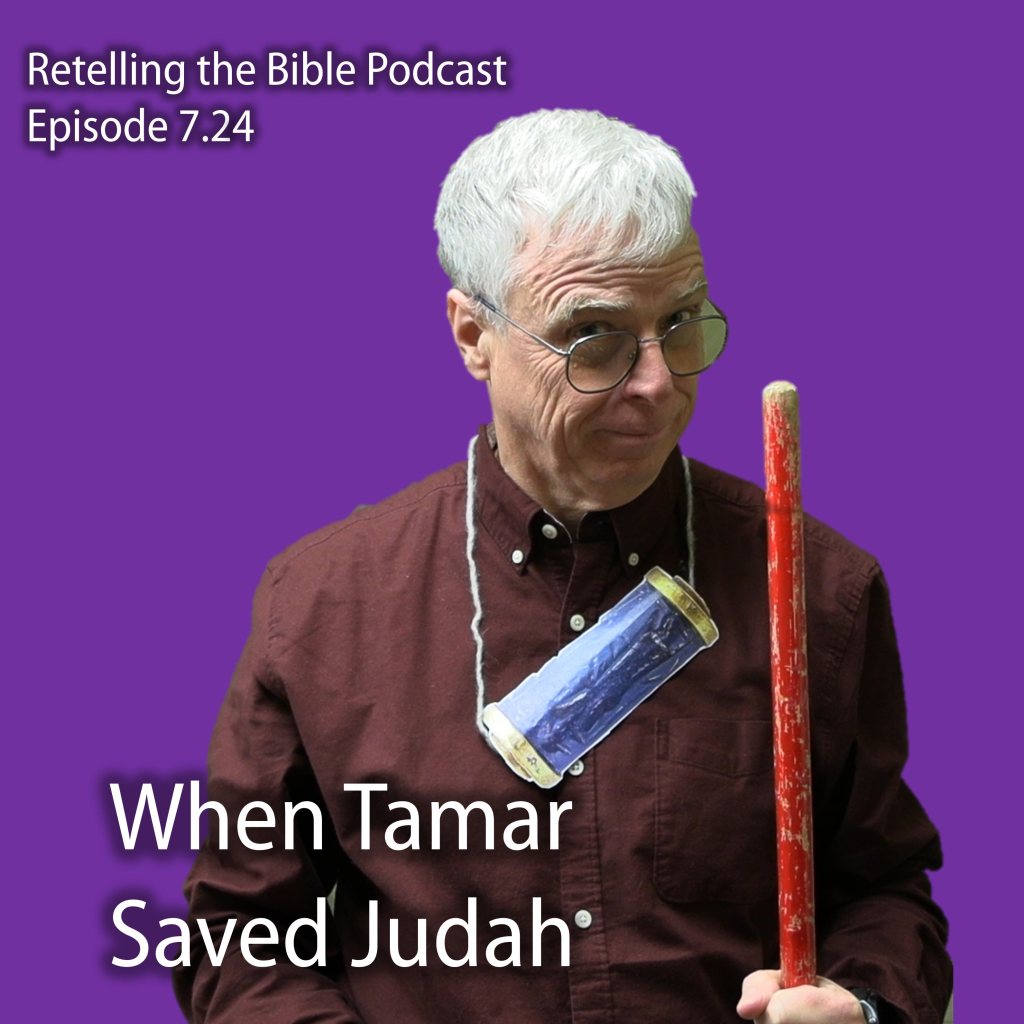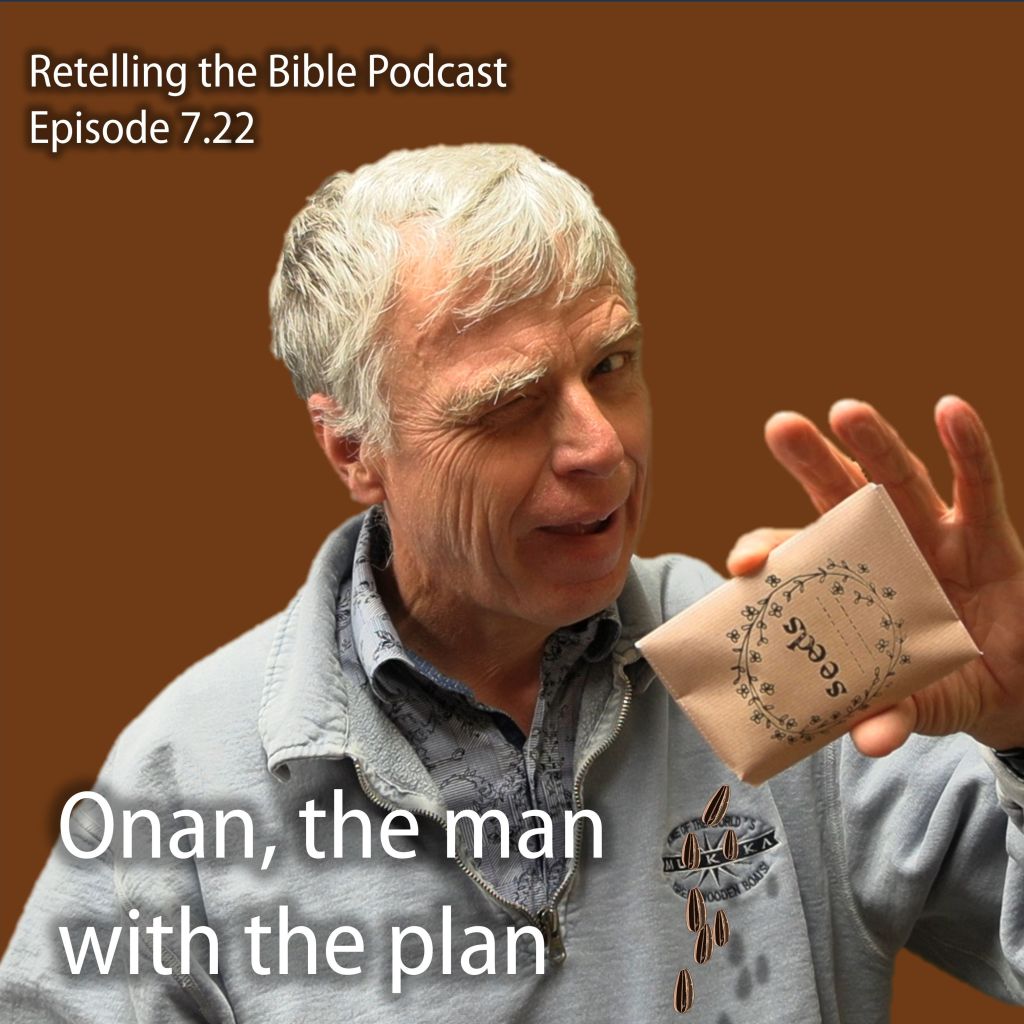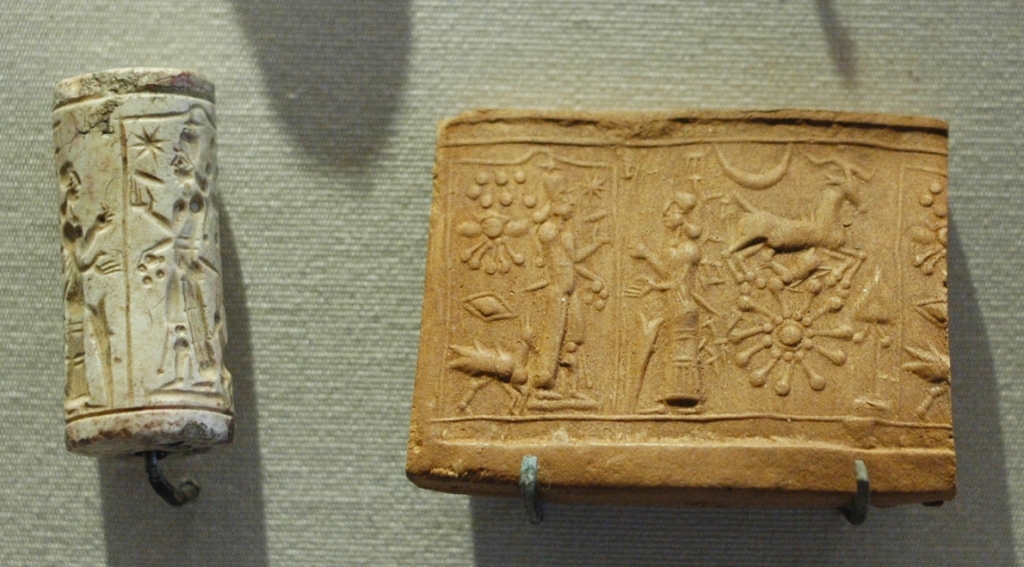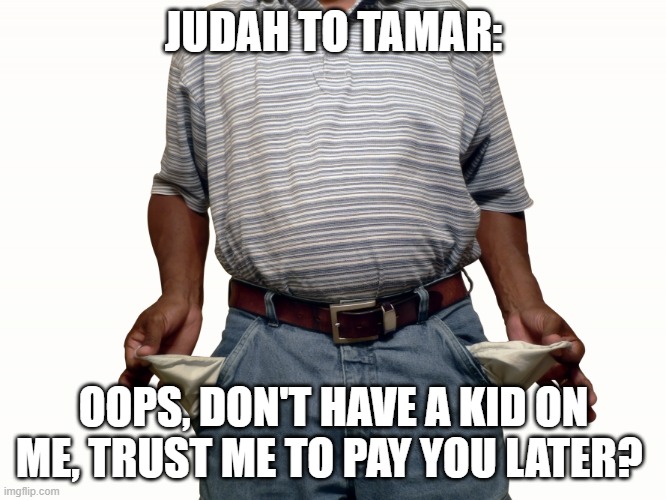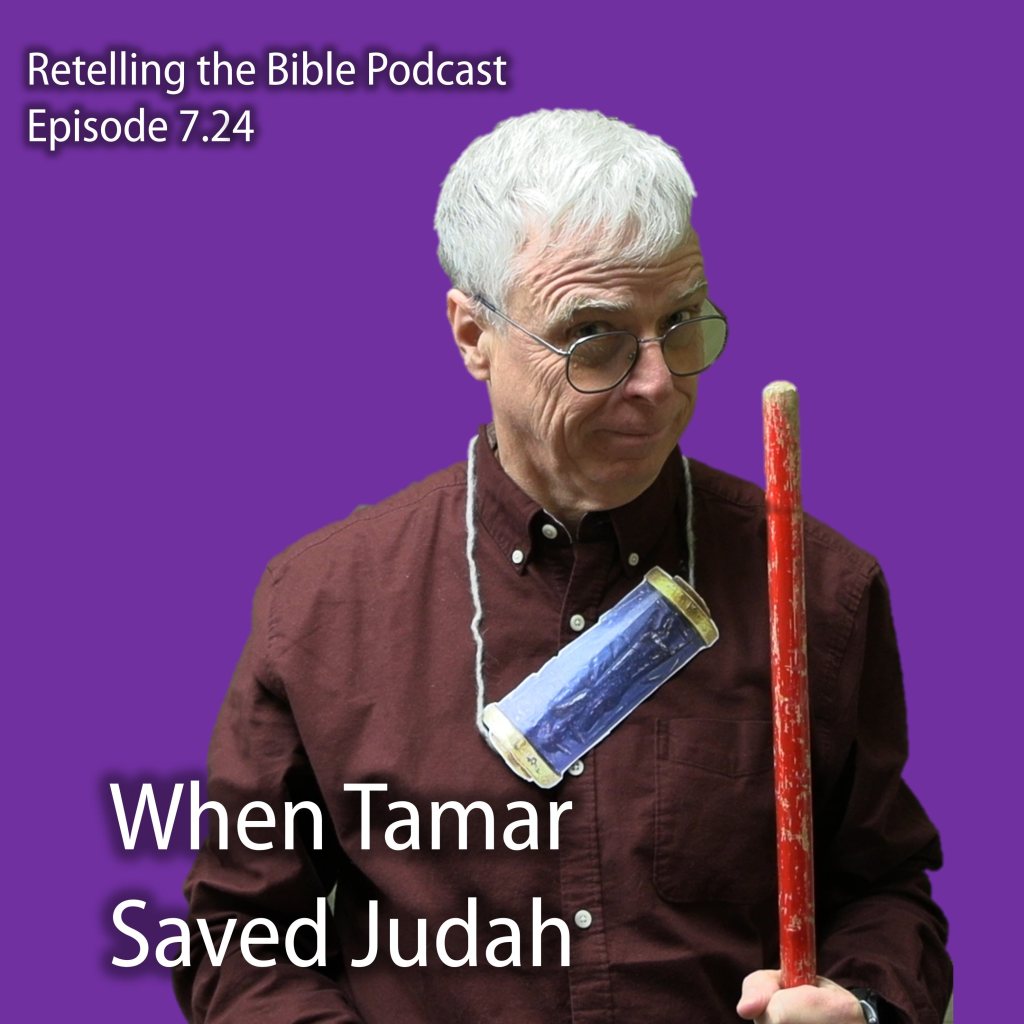The twenty-first episode of the seventh season of the Retelling the Bible Podcast is posted today (October 25, 2023). It tells the story of Onan, the son of Judah, and his fraught relationship with his brother Er’s wife, Tamar.
Please note: Because of the nature of the Biblical story, the episode contains accounts of abusive and non-consensual sex.
You can listen to the episode right now and subscribe to the podcast by following one of these links or by searching for the podcast on your favourite platform:
Show Notes about the Episode
This episode is based on Genesis 38:1-11. Direct biblical quotations in the episode are taken from the New Revised Standard Version Updated Edition.
Onanism
There is a long history of the condemnation of masturbation by both religious and medical authorities in Western society.
Onanism became a synonym for masturbation, as early as the 1700s when Edmund Curll published a number of risqué titles that were deemed pornographic.
The term was also used as the name for the birth control method that is commonly called coitus interruptus, in which a man withdraws his penis from a woman’s vagina prior to ejaculation. This second use is obviously much closer to what is described in the Genesis story.
The use of Onanism to describe such acts was certainly intended to give the impression that such acts were wicked and would lead to judgment — an impression that remained active for centuries.
For example, the February 1839 edition of The Eclectic Journal of Medicine (Editor John Bell, Philadelphia) published this warning about the dangers of Onanism:
Hypochondriasis, hysteria, chorea, epilepsy, apoplexy, and palsy, constitute part of the list of dire maladies induced or immediately excited, by onanism and immoderate or ill-timed coition. The memory and intellectual faculties, in general, are enfeebled, and there are instances of complete idiocy, brought on by early and continued onanism, and of insanity from similar excesses later in life.
Levirate Marriage
But the story of Onan is concerned with neither masturbation nor coitus interruptus. It is concerned with levirate marriage — a practice that was not uncommon in the ancient world as a means of ensuring a heritage for a dead brother in a family. The brother of a man who had died without an heir would marry his widow for the sole purpose of creating a male child to inherit his brother’s property.
The story in Genesis only suggests one reason why Onan did not want to have a child with his older brother’s widow: “Onan knew that the offspring would not be his.”
But as I tried to imagine the story behind this man and what might have motivated him, I came to the conclusion that it must have been a little bit more complicated than that. As I say in the episode, the more I understood what Onan’s motivations might have been, the less I liked him.
How did Everyone Know?
Oddly, in this story, everyone appears to know that Onan is the cause of Tamar’s inability to have a child. This is rather unusual in biblical literature. In most Old Testament stories, when a woman fails to produce a male child, she is the one who is blamed; it is considered to be her fault or failure.
And so I had to ask why, in this story, everyone decided to blame Onan instead of Tamar. I assumed that she must have already produced a child, which would have proved her fertility and that she was, therefore, not the cause of the failure. But, since she had not produced a son for Er, I reasoned that, in the logic of the story, she must have had a girl.
For me, this had the effect of increasing my sympathy for the plight of Tamar, a single mother, and my dislike of Onan for keeping her in such a precarious position.
The deaths of Er and Onan
According to this story, both Er and Onan die because “the LORD put [them] to death.” It appears to use the language of judicial killing, but I really struggled with how to portray that in narrative form.
There is no reference in the story itself to God announcing the judicial nature of these killings. It is simply something that the narrator knows. But how?
I know, of course, that there are many who would argue that the answer to that is divine inspiration. Somehow, God confessed God’s responsibility for these killings to the writer. But I am not one to be overly inclined to jump to such supernatural explanations. I don’t really have a problem with the notion of divine inspiration, but I usually prefer to find a more natural explanation when that is possible.
That is why I recounted the deaths of these two brothers in the way that I did. If each brother died in a sudden and unexplained way, such deaths would have naturally led in that culture to the speculation that the cause was divine judgment. Thus, I see the reason for their deaths to be a matter of interpretation of events, perhaps inspired interpretation, but interpretation nonetheless.
Looking at a Woman with Lust
As I noted in the episode, the other passage that is often used to condemn masturbation is a saying of Jesus from the Sermon on the Mount.
“You have heard that it was said, ‘You shall not commit adultery.’ But I say to you that everyone who looks at a woman with lust has already committed adultery with her in his heart.
Matthew 5:27-28
What Jesus is doing in this part of the Sermon on the Mount is making commentary on Old Testament law. He is not doing this in order to critique the law, but in order to encourage people to follow it according to its deepest intention. And so, he introduces this part of the sermon by saying, “Do not think that I have come to abolish the Law or the Prophets; I have come not to abolish but to fulfill.”
The particular law he is talking about is, of course, one of the Ten Commandments, the one that says, “You shall not commit adultery.” (Exodus 20:14) That is important to realize because, when Jewish teachers quoted a short passage from the Torah, they would have expected their listeners to have the verses that surrounded the one that they quoted in their minds.
And do note that immediately after the commandment against adultery in the Book of Exodus, the very next commandment goes like this: “You shall not steal.” And then, two commandments later, we have the final commandment that goes like this: “You shall not covet your neighbour’s house; you shall not covet your neighbour’s wife, male or female slave, ox, donkey, or anything that belongs to your neighbour.”
Aren’t They All Saying the Same Thing?
There is something odd about these three commandments. There is a sense in which all three are saying the same thing. The commandment against adultery means you shouldn’t take someone else’s spouse. The commandment against stealing means you shouldn’t take someone else’s stuff. But then we get to the “thou shalt not covet” commandment and, all of a sudden, we seem to be going over the same ground, don’t we?
Except now, instead of saying that you shouldn’t take your neighbours’ stuff, it is saying that you shouldn’t even want to take your neighbour’s stuff. And, since your neighbour’s wife is also included in the list of your neighbour’s stuff (which I know is problematic, but we’ll come back to that), this commandment also seems to cover the prohibition against adultery.
How You Obtain Other People’s Stuff
So, what is going on here? Are not all of these commandments saying the same thing? Well, not exactly. According to the Hebrew way of thinking, stealing somebody else’s things was bad, but stealing was not the only bad way of getting what properly belonged to someone else.
The Bible also teaches that if you get your neighbour’s property by doing things that we would consider perfectly legal, like lending them money, charging them excessive interest and seizing their property when they couldn’t pay, that was just as bad. It was also problematic if you managed to amass profits for yourself by taking away from others what they needed.
And so, the commandment against coveting was meant to address all of the ways in which people sought to take what other people needed to live. So, while stealing and committing adultery were really bad, the root of the problem was coveting. The root of the problem was greed and desiring what other people had that they needed.
The Word Translated as Lust
Okay, so why does that matter? It matters because Jesus jumps directly from talking about adultery to looking at somebody with a certain kind of desire. But the word that is translated into English as lust in the gospel is actually the same word that is used in the ancient Greek translation of the Bible, the Septuagint, to translate the word covet in the Ten Commandments. Jesus is actually making an explicit reference to the tenth commandment.
So, what Jesus is actually saying here is not that we need to be fearful of having lustful thoughts, and that any such thoughts will immediately condemn us to hell. He is actually inviting us to shift our focus instead to the commandment against coveting. To put it another way, stealing and committing adultery are bad, but let’s not just focus on how we take other people’s stuff, let’s focus on why we want what other people need.
The Real Problem
The problem with why we want what other people need does not have to do with it being motivated by a certain kind of desire, at least not as that has been generally understood in Western culture. It is actually about the way you treat things that other people need. It is about not being greedy when you deal with other people. That means, not robbing them by illegal means, of course, but it also means not seeking to take from them through unsavoury or unethical business practices. It is about treating people properly by respecting what they need to thrive in life.
Treating Women Like Objects
Ah, but there is one other issue in all of this that we struggle with as modern people. The Old Testament law against coveting, as I mentioned before, assumes a woman is a mere object. The law lists, among your neighbour’s possessions, your neighbour’s wife.
Does that mean that women actually are merely objects? Of course not! It’s just that this law was written within a society where women were seen that way. And even divine laws like the Ten Commandments were filtered through the cultural understandings of the people who received them and used them.
But is Jesus saying anything about all of that when he points us to this commandment about coveting? I believe he is. The laws against adultery both in Old Testament times and in Jesus’ times were based on patriarchal assumptions. That is to say, they assumed that your neighbour’s wife was part of your neighbour’s property. The law had to be formulated according to the assumptions of the society, otherwise, it would have made no sense to people. And so, adultery was considered to be a property crime.
Jesus’ Comments on the Assumption
But notice what Jesus does with that. When he says that you ought not to look at a woman with a covetous attitude – because that is what he is saying – he is in effect saying that it is wrong to look at a woman as a piece of property.
Now isn’t that interesting! And when we come to read it that way, we realize that what Jesus is really concerned about is not that we might entertain, however fleetingly, certain thoughts or ideas that are actually a part of the way in which we have been constructed to operate.
Jesus’ Ultimate Concern
No, what Jesus is ultimately concerned about is how we treat women, how we treat people. He wants to make sure that we do not treat people like mere objects. He is concerned that we deal with them as persons who have their own thoughts, needs and concerns. I would even say that there is, in this teaching, an implied criticism of the patriarchal society that Jesus lived in and the way that it operated.
The Story Continues!
Onan may be done for, but Tamar’s story is really only beginning at this point. I pick up her amazing story in this episode: 7:24 When Tamar Saved Judah. Give it a listen. More people should know the story of this biblical heroine!
Media in this Episode
The following music was used for this media project:
Music: AhDah by Kevin MacLeod
Free download: https://filmmusic.io/song/3345-ahdah
License (CC BY 4.0): https://filmmusic.io/standard-license
Artist website: https://incompetech.com
“Scheming Weasel (slower version)” Kevin MacLeod (incompetech.com)
Licensed under Creative Commons: By Attribution 4.0 License
http://creativecommons.org/licenses/by/4.0/
“Scheming Weasel (faster version)” Kevin MacLeod (incompetech.com)
Licensed under Creative Commons: By Attribution 4.0 License
http://creativecommons.org/licenses/by/4.0/
Music: Scheming Weasel [Metal Version] (feat. Kevin MacLeod) by Alexander Nakarada
Free download: https://filmmusic.io/song/8163-scheming-weasel-metal-version-feat-kevin-macleod
Licensed under CC BY 4.0: https://filmmusic.io/standard-license
Support Retelling the Bible
If you would like to support the work that I do creating these stories, go to patreon.com/retellingthebible and choose a level of support!




